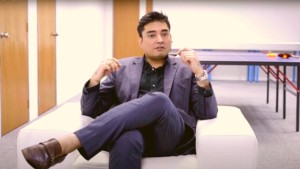From Mnemonics to Mastery: Sancy Suraj’s Secrets as a Memory Coach and Trainer
In a world where information is abundant and ever-changing, having a good memory is a valuable asset. Sancy Suraj, a Memory Coach & Trainer from Singapore, has dedicated his career to helping individuals improve their memory skills through the use of mnemonic techniques. With over 12 years of experience in training memory techniques, Sancy has taught over 10,000 people worldwide and holds six memory records. In addition, he represented Singapore at the World Memory Championships in 2011.
In this article, we delve into Sancy’s secrets as a memory coach and trainer. We asked Sancy ten questions about his career, the techniques he teaches, and the challenges he has faced as a coach. Through his responses, we gain insight into his approach to memory training, his favorite memory techniques, and the ways in which he tailors his coaching to meet the unique needs of each client.

How did you first get interested in mnemonics, and what motivated you to pursue mastery of memory techniques?
My interest in mnemonics and memory techniques was sparked during my university years while studying for my engineering degree. I found myself struggling to remember all the information I needed to succeed in my courses. That’s when I started researching different memory techniques and discovered the Memory Palace technique. I was fascinated by how effective it was in helping me retain information, and I wanted to learn more.
My passion for memory techniques grew when I realized how they could be applied in various areas of life, from academic and professional settings to personal growth and development. This realization motivated me to pursue mastery of memory techniques and become a memory coach and trainer. I wanted to help others benefit from these techniques and improve their cognitive abilities.
Through my years of experience, I have witnessed the transformative power of memory techniques and the impact they can have on an individual’s learning and growth. This knowledge continues to fuel my passion for this field, and I am motivated to keep learning and sharing my knowledge with others.
How do you typically work with clients to improve their memory skills, and what kinds of results have you seen from your coaching?
My interest in mnemonics and memory techniques was sparked during my university years while studying for my engineering degree. I found myself struggling to remember all the information I needed to succeed in my courses. That’s when I started researching different memory techniques and discovered the Memory Palace technique. I was fascinated by how effective it was in helping me retain information, and I wanted to learn more.
My passion for memory techniques grew when I realized how they could be applied in various areas of life, from academic and professional settings to personal growth and development. This realization motivated me to pursue mastery of memory techniques and become a memory coach and trainer. I wanted to help others benefit from these techniques and improve their cognitive abilities.
Through my years of experience, I have witnessed the transformative power of memory techniques and the impact they can have on an individual’s learning and growth. This knowledge continues to fuel my passion for this field, and I am motivated to keep learning and sharing my knowledge with others.
Can you walk us through one or two of your favorite memory techniques, and explain how they work?
My coaching process is tailored to each individual client’s needs and goals. I begin with an assessment of their current memory abilities and identify areas for improvement. From there, I teach them a variety of memory techniques and strategies, such as the Memory Palace and the Link Method, and help them apply these techniques to their specific learning objectives.
I also work with my clients to develop their overall cognitive abilities, including focus, attention, and visualization skills. By practicing these skills, my clients can better process and retain information, which translates into improved academic or professional performance.
The results of my coaching have been consistently positive. Clients have reported significant improvements in their memory abilities, such as remembering more information, recalling it more easily and quickly, and retaining it over the long-term. These improvements have resulted in higher grades, better job performance, and a more fulfilling personal life.
“My coaching process is designed to unlock the full potential of my clients’ memory abilities. Through personalized assessment and targeted instruction in memory techniques and cognitive skills, I empower my clients to achieve their learning objectives and improve their overall performance. The positive results speak for themselves – improved memory, better grades, increased productivity, and a more satisfying personal life.”
What are some of the biggest challenges you’ve faced as a memory coach, and how have you overcome them?
One of my favorite memory techniques is the Memory Palace, also known as the Method of Loci. This technique involves visualizing a familiar space, such as a house or a street, and associating specific pieces of information with different locations within that space. By mentally walking through the space, one can recall the information associated with each location.
Another technique I use frequently is the Link Method. This technique involves creating a mental image that connects one piece of information to another. By creating a visual association between the two pieces of information, it becomes easier to recall both.
These techniques work by utilizing the brain’s natural ability to remember visual and spatial information. By creating vivid mental images and associating them with specific locations or other pieces of information, the brain is better able to encode and recall that information over the long-term.
How do you stay up-to-date on the latest research and developments in memory science, and how do you incorporate that knowledge into your coaching?
As a memory coach, one of the biggest challenges I have faced is helping my clients overcome their own limiting beliefs about their memory abilities. Many people come to me with the belief that they simply have a “bad memory” and that they will never be able to improve. However, I have found that this is simply not true. With the right techniques and mindset, anyone can improve their memory. To overcome this challenge, I work with my clients to help them develop a growth mindset and show them that their memory is not fixed but can be improved with practice.
Another challenge I have faced is adapting my coaching style to meet the unique needs of each client. Everyone has different learning styles and personalities, so I must be flexible in my approach to ensure that each client is receiving the support they need to succeed. To overcome this challenge, I take the time to get to know each client and their individual needs, and tailor my coaching to match.
“As a memory coach, I understand that everyone has their own unique learning style and personality, which is why I adapt my coaching approach to meet their needs. My goal is to help my clients overcome limiting beliefs about their memory abilities and develop a growth mindset, so they can achieve their goals and unlock their full potential. With the right techniques, mindset, and support, anyone can improve their memory and achieve remarkable feats of learning.”
Sancy’s motivation for pursuing mastery of memory techniques began in his teenage years. He recalls that he struggled with memorizing dates and names in history class and was inspired to find a solution to this challenge. After discovering memory techniques through research and experimentation, Sancy was hooked and began practicing them regularly. This led him to pursue a career in memory coaching and training.
As a memory coach, Sancy works closely with his clients to identify their goals and learning styles. He tailors his approach to meet their unique needs, providing individualized coaching that can range from one-on-one sessions to large group workshops. Sancy’s clients have reported significant improvements in their memory skills, which have helped them in both their personal and professional lives. Some have been able to achieve academic success, while others have been able to excel in their careers by improving their communication and leadership skills.
One of Sancy’s favorite memory techniques is the “Memory Palace,” also known as the “Method of Loci.” This technique involves visualizing a familiar place, such as a house or a street, and associating different pieces of information with specific locations in that place. Sancy explains that this technique works because our brains are wired to remember spatial information, making it easier to recall information when it is associated with a specific location. Another favorite technique of Sancy’s is the “Major System,” which involves assigning numbers to consonant sounds and then creating words or phrases that can be easily memorized. This technique is especially useful for remembering numerical information, such as phone numbers or dates.

Can you share some examples of how your memory training techniques have helped clients in their personal and/or professional lives?
Staying up-to-date on the latest research and developments in memory science is crucial to my work as a memory coach. To stay current, I attend conferences and workshops, read academic journals and books, and follow the work of leading researchers in the field. In addition, I am part of a community of memory coaches and trainers who share information and insights with one another.
Incorporating this knowledge into my coaching is important because it allows me to provide my clients with the most effective and up-to-date techniques and strategies for improving their memory. I regularly update my coaching materials and techniques to reflect the latest research and insights, and I am always experimenting with new approaches to see what works best for my clients. Ultimately, my goal is to help my clients achieve their memory goals and become lifelong learners, and staying up-to-date on the latest research and developments is key to achieving this goal.
What advice would you give to someone who is just starting to learn about memory improvement techniques, and wants to start practicing them on their own?
Staying up-to-date on the latest research and developments in memory science is crucial to my work as a memory coach. To stay current, I attend conferences and workshops, read academic journals and books, and follow the work of leading researchers in the field. In addition, I am part of a community of memory coaches and trainers who share information and insights with one another.
Incorporating this knowledge into my coaching is important because it allows me to provide my clients with the most effective and up-to-date techniques and strategies for improving their memory. I regularly update my coaching materials and techniques to reflect the latest research and insights, and I am always experimenting with new approaches to see what works best for my clients. Ultimately, my goal is to help my clients achieve their memory goals and become lifelong learners, and staying up-to-date on the latest research and developments is key to achieving this goal.
How do you tailor your coaching approach to meet the unique needs and learning styles of different clients?
My advice to someone just starting to learn about memory improvement techniques is to start small and be consistent. You don’t have to master every technique all at once, but rather focus on one or two that resonate with you and practice them regularly. For example, you might start with a memory palace, which is a technique that involves associating information with specific locations in a familiar setting.
To practice, you might start with a short list of items, such as a grocery list or a list of people’s names. As you become more comfortable with the technique, you can gradually increase the amount of information you’re able to remember.
It’s also important to stay motivated and have fun with the process. Memory training doesn’t have to be a chore; in fact, incorporating fun and creativity into your practice can make it more effective. For example, you might use colorful imagery or make up silly stories to help you remember information.
What role does practice and repetition play in mastering memory techniques, and how do you encourage clients to continue practicing on their own?
Practice and repetition are essential for mastering memory techniques. Like any skill, memory training requires consistent effort and dedication over time. I encourage clients to make memory training a part of their daily routine, even if it’s just a few minutes each day. This helps to reinforce the techniques and make them a natural part of their thinking process.
I also encourage clients to set specific goals for themselves and track their progress over time. This can be a powerful motivator and help to keep them on track. For example, a client might set a goal of memorizing a certain amount of information by a specific deadline, and then work backwards to create a plan for achieving that goal.
Ultimately, the key to success with memory training is to stay committed, stay positive, and keep practicing. With time and effort, anyone can improve their memory skills and achieve their goals.
Finally, looking back on your career as a memory coach and trainer, what are some of the accomplishments or moments that you are most proud of?
Looking back on my career as a memory coach and trainer, I am proud of the impact I’ve been able to make on the lives of so many people. Whether it’s helping a student improve their grades, or helping a professional achieve greater success in their career, it’s incredibly rewarding to see the positive changes that can result from another moment that I am particularly proud of is representing Singapore at the World Memory Championships in 2011. It was an honor to be able to showcase my skills on a global platform and to compete against some of the world’s top memory athletes. While I did not win the championship, I was able to hold my own and finish in the top 20, which was a great achievement for me.
Overall, I am proud of the impact that I have been able to make as a memory coach and trainer. Seeing my clients make significant improvements in their memory skills and achieve their personal and professional goals is incredibly rewarding. It is my hope that through my work with Memory Coach and my individual coaching sessions, I can continue to empower individuals to unlock the full potential of their minds and achieve lifelong learning.
“I am proud to have been able to positively impact the lives of so many through my career as a memory coach. From helping students achieve higher grades to supporting professionals in their careers, the rewards of seeing the positive changes that result from improving memory skills cannot be overstated. Representing Singapore at the World Memory Championships in 2011 was another highlight of my career, and though I did not win, finishing in the top 20 was a great personal achievement. Through my work with Memory Coach and individual coaching, I hope to continue empowering individuals to unlock their full potential and achieve lifelong learning.”
Sancy Suraj’s dedication to memory training and coaching has made a significant impact on the lives of his clients. Through his use of mnemonic techniques and tailored coaching approaches, Sancy has helped individuals of all ages and backgrounds improve their memory skills and achieve their personal and professional goals. His own experiences with memory struggles have inspired him to pursue this career, and his success as a memory coach and trainer has solidified his position as a leader in this field. We hope that this article has provided insight into the valuable work that Sancy does and has inspired readers to explore the world of memory techniques for themselves.
Click here for more information on our Memory Courses

